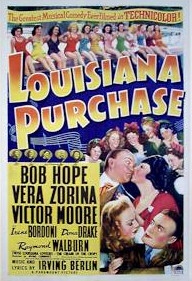
Louisiana Purchase is a musical with music and lyrics by Irving Berlin and book by Morrie Ryskind based on a story by B. G. DeSylva. Set in New Orleans, the musical lightly satirises Louisiana Governor Huey Long and his control over Louisiana politics. An honest U.S. senator travels to Louisiana to investigate corruption in the Louisiana Purchase Company; the company's lawyer attempts to divert him via the attentions of two beautiful women, but the senator maintains his integrity and ends up marrying one of them. In 1941 it was adapted for the film Louisiana Purchase directed by Irving Cummings.

Lemeul Eugene Lucas, better known by his stage name Gene Austin, was an American singer and songwriter, one of the early "crooners". His recording of "My Blue Heaven" sold over 5 million copies and was for a while the largest selling record of all time. His 1920s compositions "When My Sugar Walks Down the Street" and "The Lonesome Road" became pop and jazz standards.

Roberta is a musical from 1933 with music by Jerome Kern, and lyrics and book by Otto Harbach. The playful romantic comedy is based on the novel Gowns by Roberta by Alice Duer Miller. It features the songs "Yesterdays", "Smoke Gets in Your Eyes", "Let's Begin", "You're Devastating", "Something Had To Happen", "The Touch of Your Hand" and "I'll Be Hard to Handle".

Vera Zorina, born Eva Brigitta Hartwig, was a Norwegian ballerina, theatre and film actress, and choreographer. Today, she is chiefly remembered for her films choreographed by her then-husband George Balanchine. They include the Slaughter on Tenth Avenue sequence from On Your Toes, The Goldwyn Follies, I Was an Adventuress with Erich Von Stroheim and Peter Lorre, Louisiana Purchase with Bob Hope, and dancing to "That Old Black Magic" in Paramount Pictures' Star Spangled Rhythm.

"That Old Black Magic" is a 1942 popular song written by Harold Arlen (music), with the lyrics by Johnny Mercer. They wrote it for the 1942 film Star Spangled Rhythm, when it was first sung by Johnny Johnston and danced by Vera Zorina. The song was nominated for the Academy Award for Best Original Song in 1943 but lost out to "You'll Never Know".

John Beach Litel was an American film and television actor.

Victor Fred Moore was an American actor of stage and screen, a major Broadway star from the late 1920s through the 1930s. He was also a writer and director, but is best remembered today as a comedian, playing timid, mild-mannered roles. Today's audiences know him as the star of a Christmas-themed movie that has become a perennial: It Happened on 5th Avenue (1947). Moore plays a vagrant who occupies a millionaire's mansion—without the millionaire's knowledge—while the owner is vacationing.
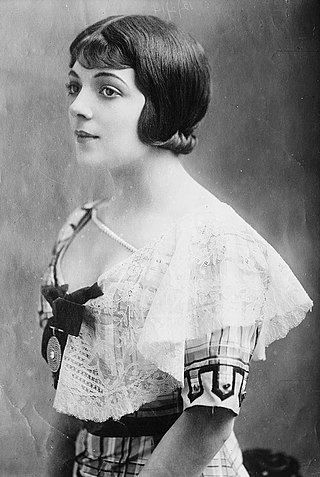
Irène Bordoni was a Franco-American actress and singer.

For Whom the Bell Tolls is a 1943 American epic war film produced and directed by Sam Wood and starring Gary Cooper, Ingrid Bergman, Akim Tamiroff, Katina Paxinou and Joseph Calleia. The screenwriter Dudley Nichols based his script on the 1940 novel For Whom the Bell Tolls by American novelist Ernest Hemingway. The film is about an American International Brigades volunteer, Robert Jordan (Cooper), who is fighting in the Spanish Civil War against the fascists. During his desperate mission to blow up a strategically important bridge to protect Republican forces, Jordan falls in love with a young woman guerrilla fighter (Bergman).
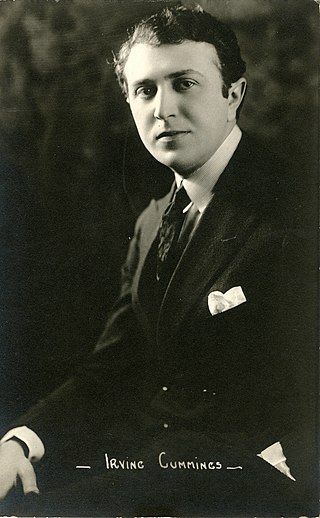
Irving Cummings was an American movie actor and director.

Star Spangled Rhythm is a 1942 American all-star cast musical film made by Paramount Pictures during World War II as a morale booster. Many of the Hollywood studios produced such films during the war, with the intent of entertaining the troops overseas and civilians back home and to encourage fundraising – as well as to show the studios' patriotism. This film was also the first released by Paramount to be shown for 8 weeks.
Beau James is a 1957 American drama film directed by Melville Shavelson and starring Bob Hope, Vera Miles, Paul Douglas and Alexis Smith. It is based on a non-fiction book of the same name by Gene Fowler. The film features Hope in a rare dramatic role as Jimmy Walker, the colorful but controversial Mayor of New York City from 1926 to 1932.

This is a selection of films and television appearances by British-American comedian and actor Bob Hope (1903-2003). Hope, a former boxer, began his acting career in 1925 in various vaudeville acts and stage performances
Princess Charming is an operetta with music composed by Albert Szirmai. The English libretto by Arthur Wimperis and Lauri Wylie is based on the Hungarian libretto by Franz Martos. The operetta is set in the Palace of the Elyrian Embassy in the fictional European country of Novia and the Sigman Castle adjoining the Royal Palace. The story concerns a young princess who accepts a proposal of marriage from the elderly king of a neighboring country as protection against an uprising by her own subjects. Captain Torrelli, a military officer sent by the king, fears imminent danger to the princess and marries her himself. The officer then escorts her to his king for an annulment, but the couple fall in love and elope.
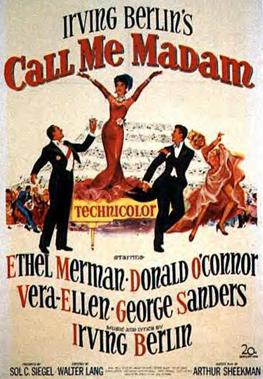
Call Me Madam is a 1953 American Technicolor musical film directed by Walter Lang, with songs by Irving Berlin, based on the 1950 stage musical of the same name.
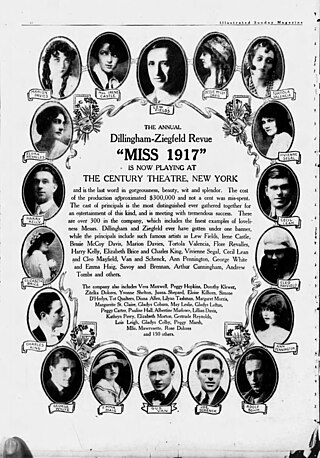
Miss 1917 is a musical revue with a book by Guy Bolton and P. G. Wodehouse, music by Jerome Kern, Victor Herbert and others, and lyrics by Harry B. Smith, Otto Harbach, Henry Blossom and others. Made up of a string of vignettes, the show features songs from such musicals as The Wizard of Oz, Three Twins, Babes in Toyland, Ziegfeld Follies and The Belle of New York.
"It's a Lovely Day Tomorrow" is a song written in 1938 by composer Irving Berlin.
